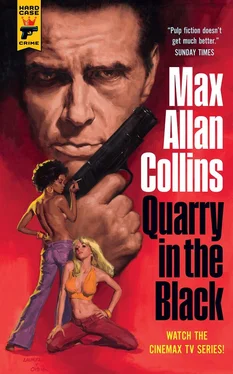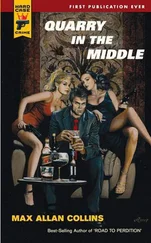He was shaking his head. “We’ll be long gone.”
“Maybe. Normally. But I’m going undercover today, and people will see my face and post-game there will be police sketch artists talking to staffers and Christ knows what all. Wanting to know all about their fellow staffer who came on recently and then up and disappeared. Right after the tragedy.”
He stroked his mustache with a thumb and forefinger; he did that sometimes, when he was actually thinking.
Then he said, “No offense, Quarry, but your face is about as memorable as a mannequin. Still, however this goes down, whoever hired it, the cops and probably feds’ll be all over it.” Very quietly he said, “The next Martin Luther King, remember?”
I shook my head. “Maybe for a day or two. But they’ll dig in and come up with drugs and organized crime, fucking quick, and the manhunt for the Reverend’s ‘slayer’ will go back-burner so fast, you’ll get a nosebleed.”
He thought about it. Sipped some coffee. Thought some more. “You’re right. If he’s dirty, it’ll come out, whoever hired it done.”
Now I thought about it. Sipped. Thought some more. “Maybe. Maybe.”
“You think we should bail?”
“Not sure yet.”
The black caterpillars that were his eyebrows rose. “What about your Hee-Haw honey?”
I pushed my plate away, half-eaten. “I’ll stay in touch with her sweet little ass. I don’t know if she’s keeping an eye on us or not, but I’ll sure as shit keep an eye on her.”
“But, Quarry,” Boyd said with sarcastic mock-concern, “how can you fuck her now that you know she doesn’t like black people? Doesn’t it just sicken you?”
“You know what would sicken me? Details of your love life. Just like mine would sicken you.”
He didn’t argue the point. I let him pay and then we walked back. Back to our apartment below Becky’s.
Just after nine A.M., I entered the office of the St. Louis Civil Rights Coalition, where in a space three times as long as it was wide, a group of people ranging in age from twenty to fifty were at beat-up mismatched desks on phones or at old typewriters or up and around bustling from here to there, usually with clipboard in hand. A chattering teletype was going along one wall near three four-drawer files; the opposite wall had a fold-up banquet table of coffee and refreshments. At the rear were a pair of glassed-in offices at left and right, with restrooms between. The walls bore more McGovern for President posters but also some for a black guy named Bill Clay who was running for re-election to the House of Representatives.
The racial makeup of this group was a little surprising — perhaps only a third were black, although that sub-group was of varied age while the whites were mostly college kids or recent grads. Some of them may have been at that bar last night. What unified them was clothing. In my limited imagination, I had figured I’d walk into something out of Shaft or Superfly — wild colors, African prints, tie-dye, Dashikis — but this was a world instead of conservative black or brown suits with ties on the males, and conservative pantsuits for the females, with only the occasional splash of color from a blouse. Solid colors, though: yellow, navy, deep red. No flower-power prints.
Just three steps in and I felt out of place, though I was following exactly what the Broker had suggested — coming in wearing a light-blue Ban-Lon sportshirt, new jeans and Hush Puppies, plus the windbreaker (minus the nine-millimeter Browning).
“Casual but not sloppy,” he advised. “And then bring several business suits.”
But that was all he’d said on the subject.
On the other hand, Afros abounded, including some pseudoones on the white kids, though the more extreme examples were on the girls. Or rather women. Despite the predominance here of youth, nobody here looked very much like a “girl.”
Also, nobody here was any kind of receptionist. I felt more like I’d wandered into a newsroom or maybe a horse-betting parlor. I saw the occasional eyes flick my way as a staffer passed on, headed to deal with something more important than a walk-in in fucking Hush Puppies.
Finally a young woman — twenty-five? — at a desk to my left hung up the phone and glanced at me. She had a full Afro that Angela Davis might have envied, big hoop earrings swinging out from under, with a maroon vest and matching pants, a navy-blue pointy-collar blouse beneath.
“Yes?” she said, as if I’d asked a question.
I stood before her like a naughty student at the teacher’s desk with no apple in hand. “I’d like to apply.”
A smile twitched on lips glossed dark red. Her skin was a rich caramel but her features were rather Caucasian, as if one parent had been from Nigeria and the other from Denmark. Her eyes were big and dark, her eye shadow dark too, the long lashes real. Or anyway real enough to fool me.
“Why?” she said coolly. “Did someone tell you we were hiring?”
“Sorry. I meant to say ‘volunteer.’ ”
Eyebrows that were already arching arched some more. “Do I look like a recruiting sergeant?”
“No, you do not look like a recruiting sergeant. So then, you’re a volunteer?”
My tone had been innocent — that took some effort I admit — and she was a little thrown.
She said, “No, actually I’m paid staff.”
“Does it pay well?”
“...uh, not particularly.”
“Makes sense.”
The dark eyes flared. “It does?”
“Yeah. It never pays that well.”
“What?”
“Humiliating people.”
And I gave her a nice big smile, and a quick salute. “I’ll just be going...”
“No! Excuse me. Sorry! Young man! ”
I was already out on the sidewalk. But I was waiting, zipping up my windbreaker to make it look like I was doing something.
Then she was at my side. She was as tall as I was. Or anyway in those platform shoes she was.
“I didn’t mean to be rude,” she said, and sounded sincere enough.
“I’m not any younger than you.”
“Huh?”
“You said, ‘Young man.’ Actually, you said, ‘Young man!’ Kind of like my third-grade teacher, who you remind me of a little, only her big hair was gray.”
She just stared at me, like I’d thrown cold water in her face.
Then she started to laugh. Hard enough that she grabbed onto my sleeve. I am one fucking charmer.
Then, her laughter gone, replaced by mild embarrassment, she let go of my sleeve but stood fairly close. She had on a perfume I never smelled before, and it was nice. Spicy.
“I’m sorry,” she said. “We’re very busy right now, a lot going on, and I... didn’t meant to be rude.”
“No problem.”
“Thank you. Shall we start over?”
“Why don’t we skip the pleasantries and go right to where you sit at your desk and I sit in that empty chair alongside it, and you ask me all about myself?”
So we did that.
I told her my name was John Blake and that I’d been stateside for about two years following three tours in Vietnam, where I’d won the Bronze Star. That I’d joined Vietnam Veterans Against the War and participated in lots of demonstrations, everything from small protests to Operation RAW (Rapid American Withdrawal).
“I was never a paid staffer,” I told her. “Just another grunt. I inherited my folks’ farm in Idaho and sold it, so I’m still fairly flush. I can afford to indulge my conscience for a while.”
She was nodding, listening intently, really buying in. “Why did you leave VVAW?”
I shrugged. “Membership is shrinking. With the Paris Peace Talks and all, a lot of guys figured they’d made their point, and booked it. Felt we’d won the peace in a war that didn’t give us many victories.”
Читать дальше











